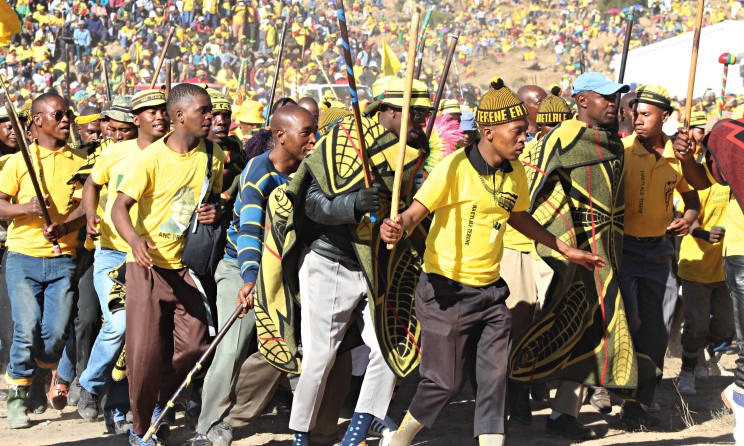…as Sophonea presents M24.8billion budget
Mohloai Mpesi
The Minister of Finance Thabo Sophonea is glad that government has trimmed down the budgetary fiscal deficit from 13% to 7.7% when, this he said in his fiscal estimates for the year 2022-2023 yesterday at the ministry’s boardroom.
Sophonea told the media in a press briefing instigated after his bid to address the budget to the National Assembly nosedived following a disruption that ended in bitter tastes on Wednesday where the ruling All Basotho Convention (ABC) caucus lodged a correspondence letter withdrawing their party from the reigning government.
He said the government is on the threshold to wiping out the international loan and fiscal deficit which is projected to go below the binding 3% as set out by the International Monitory Fund (IMF).
Although Sophonea is adamant and boastful that his government has reduced the shortfall of funds, he presented a M24.8billion with a recurrent expenditure amounting to a lucrative M18.1billion and a capital budget at a shoddy M6.8billion.
“The size of fiscal deficits and financing gaps are smaller but accommodate the recovery spending, meaning that we are going to experience the size of debt limit and debt recovery will be accommodated.
“Our last year fiscal deficit was 13% and we now have 7.7% for this year and our projection for the coming year is expected to be around 3.8%.
“The target is that we should not surpass 3% of GDP as according to our economic status and that we should have surplus at some point, but since we are walking through the Covid-19 pandemic that’s why we have budget deficits.
“We are still consuming more than we gain, our situation is still worse although we are trying to make adjustments it’s clear that we are living on loans, but this shows a positive sign that we might find ourselves having a surplus, in overall we are still going through a rough patch and we are not financially stable,†Sophonea said.
He unpacked the budget themed; Building resilient sustainable and innovative economy, fiscal consolidation amid Covid-19 with policy proposals anticipated to boost and recover from the dwindling economy if implemented.
According to the budget, the slowdown of global economy which is 5.9% has inclined to 4.4% in 2022, while in sub-Saharan forecasted to grow by 3.7% in 2022 before expanding to 4% in 2023 next year.
He highlighted that the economic sector has been allocated M1.7billion which is made of Trade, Mining, Agriculture and Range Management, while infrastructure has been allotted M4.4billion which is comprised of Energy, Roads and food bridges, transport and water resources.
Whereas Human and Social Development is apportioned M7.2billion and embraces Education and skills, development, health and wellness.
He said the government is cognisant of the pension’s schemes rot that has been on the rise to looting public funds and that in the coming fiscal year the government has committed to embark on the reforms of pension’s scheme and address the discrepancies.
He continued that they mobilised financing for development of government and successfully negotiated Millennium Challenge Compact II (MCC II) as well as Covid-19 mitigations and implementing public financial management reforms.
“One of the achievements is the infrastructure development at Mpiti Sehlabathebe and Ramarothole Solar Power generations as well as rebuilding infrastructure worn-out by heavy rains though it was not in a big capacity.
“We have 440 sanitation facilities and completed in 21 villages serving about 9100 people, during the construction we managed to create 21 000 jobs, water connection for households through Metolong is one of the achievements and initiated a number of rural electricity projects with connections of about 8000 households,†he said.
He continued that, “We promoted food productions though agriculture subsidy valued at around M140million. The economy recovery will be achieved through aggregate demand by restoring domestic consumption, renewing public and private investment and enhancing export promotion, construction and mining sectors will be major economic drivers for Lesotho.
“Major investments to drive growth are Compact II which covers the irrigation and horticulture, health system development as well as expecting to have full operation at Belo industrial, Polihali Dam constructions, government infrastructure development to support growth,†he said.
He said Lesotho is classified at the moderate debt risk and a new debt has to bring high returns through containment of government expenditure, internal reserves are expected to be at acceptable rates which is around four months of imports cover.
“So it means although our reserves are moderate we are not that bad.
“The 2022-23 budget estimates will be fully realised if the following legal frameworks are passed before the dissolution of the 10th Parliament. Our economy and recovery will depend on these proposals that we say should be adopted by the parliament before going to the general elections.
“Value Added tax (VAT) amendment bill, income tax amendment bill, Tobacco and Alcohol Levy bill 2020, Tax administration bill, LRA amendment bill and harmonization bill. These are the laws which will facilitate the collection of revenue in the country.
“The major economic transformation is expected between 2023-2024, if we protect all the pipeline investments through peace and stability and meeting all agreed prior actions including gender reforms, fighting human trafficking, and implement public financial reforms and fight corruption,†he said.
Summary
- Sophonea told the media in a press briefing instigated after his bid to address the budget to the National Assembly nosedived following a disruption that ended in bitter tastes on Wednesday where the ruling All Basotho Convention (ABC) caucus lodged a correspondence letter withdrawing their party from the reigning government.
- “We are still consuming more than we gain, our situation is still worse although we are trying to make adjustments it’s clear that we are living on loans, but this shows a positive sign that we might find ourselves having a surplus, in overall we are still going through a rough patch and we are not financially stable,†Sophonea said.
- He said the government is cognisant of the pension’s schemes rot that has been on the rise to looting public funds and that in the coming fiscal year the government has committed to embark on the reforms of pension’s scheme and address the discrepancies.

Your Trusted Source for News and Insights in Lesotho!
At Newsday Media, we are passionate about delivering accurate, timely, and engaging news and multimedia content to our diverse audience. Founded with the vision of revolutionizing the media landscape in Lesotho, we have grown into a leading hybrid media company that blends traditional journalism with innovative digital platforms.









